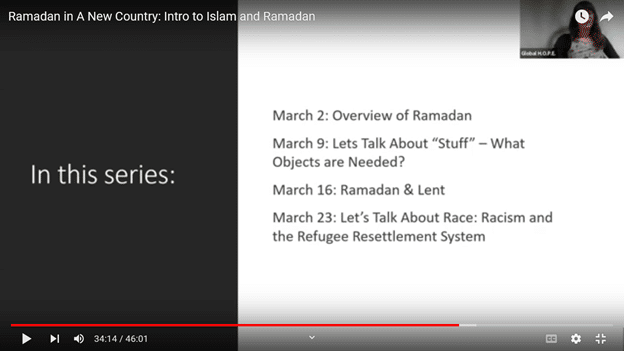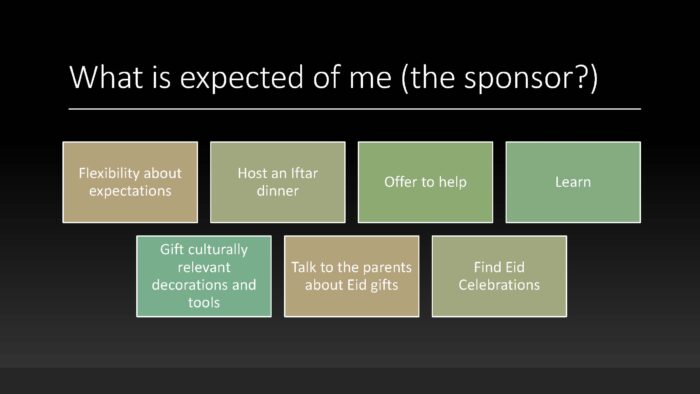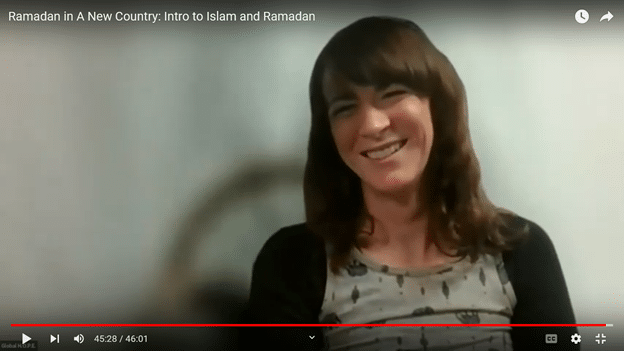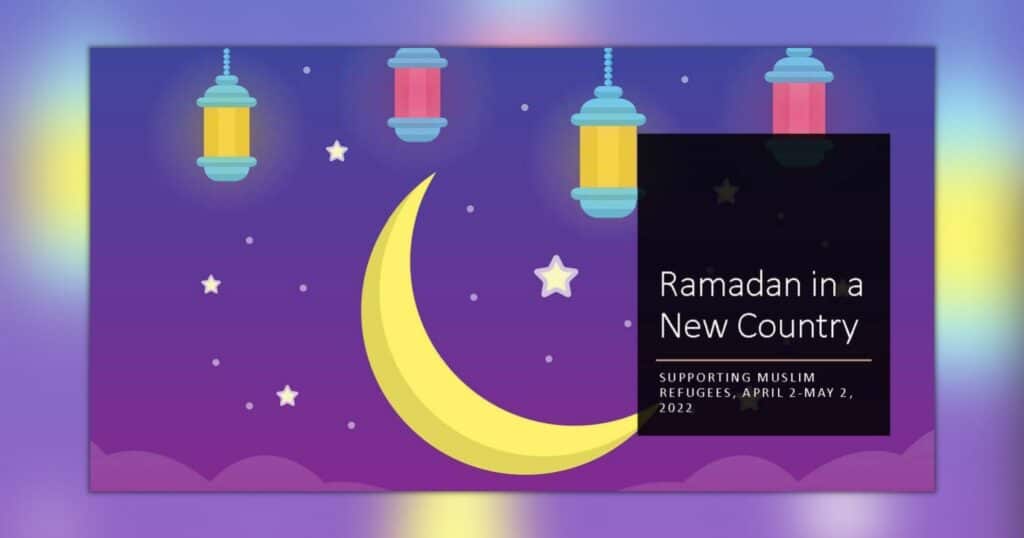Churches hosting Afghans can expect changes during Ramadan, a time of ‘intensity,’ beauty
“The way that they fast is incredibly intense.” That’s one important thing people should know about Ramadan if they are sponsoring newcomers from Afghanistan.
A refugee resettlement expert made that point March 2 in launching a series of webinars about Islam’s holy month, which starts April 2. People can learn what their Afghan guests will be going through by tuning in to the series at 7 p.m. ET March 9, 16 and 23. The Zoom link for the free sessions is here.

The Rev. Irene Willis Hassan, minister for refugee and migration services with the United Church of Christ, is hosting the webinars. She isn’t just relying on knowledge gleaned in her role on the UCC Global H.O.P.E. team. She is also drawing on her seminary studies of Islam — and her own experience of Ramadan fasting while living in Jordan.
The way Muslims observe Ramadan is similar to – but more demanding than – the Christian practice of Lent “and our idea of giving one thing up,” Hassan said in the March 2 webinar. Knowing this — and what and what not to do — will be important in working with Afghan refugees. And observe it they will: 99 percent of Afghans belong to the Sunni branch of Islam, she said.
‘They’re going to be tired’
For starters, Hassan said, Afghan guests will take no daytime food or drink throughout Ramadan’s 30 days. Not even water. At sunset every day, they will share a celebratory feast. They will stay up late to make the most of family time. They will keep on going to work and school, too. It’s part of the deliberate challenge of Ramadan.
“They’re going to be tired,” Hassan said. “They’re going to be a little ding-y. Because no matter how much practice you get, it’s not easy to go 18 hours without water.” So one gift that hosts can give them is that of understanding — just “knowing that they’re going to behave differently,” and being flexible about expectations in the sponsor-guest relationship.
Helping refugees find certain foods for their daily feast — the meal is called Iftar — is another specific way to help. Dates and soup makings are examples:
- Muslims break the daily Ramadan fast with a date and a glass of water. That’s because the prophet Muhammad is said to have broken his own fast with dates — after days spent in receiving the revelation of the Quran, Islam’s holy scriptures.
- Soup is common “because that is a safe way to bring your body back from the shock of not eating or drinking water all day,” Hassan said. So Muslims may start the evening with a cup of soup – and “sometimes that’s all they’ll eat, to be safe and not hurt themselves.”
One thing not to do, Hassan said, is express worry about the practice of fasting. “They are very good at knowing the limits of the body because they’ve been doing it for years,” she said. “They’ve perfected it to a science.” Some are exempt from the fast, including young children and people who are elderly or menstruating.
More than fasting
A family, or a church in coordination with a local mosque, might consider inviting Afghan guests to an Iftar dinner. Hassan will discuss that idea — as well as Ramadan foods, utensils, decorations and more — in the March 9 webinar, “Let’s Talk About Stuff.”
However, don’t be surprised if the guests reverse the offer, Hassan said. “If you invite your family to come to your house for dinner, they’ll probably want to do the opposite, because it’s an act of charity to feed you.”
Charity is one of many Ramadan practices that Hassan described. She said the month also involves:
- Restriction of worldly habits: not only eating and drinking, but also smoking, sex, music and cursing.
- Elevation of spiritual habits: prayer, reading, Quran study and kindness.
- “Night cultural habits,” including family time, seasonal television shows, games and visits to cultural activities.
What to offer
But fasting and food is indeed central — and therein lies a clue in what to offer, Hassan said. “Offer to help – especially the women. Women are in the kitchen cooking all of this food when they are very hungry. Let me tell you what – that’s very hard to do, to cook an enormous meal when you are running on a very empty tank of gas.

“So, offering to help with the kids so that they can focus on cooking; offering to help clean so that that they can rest; or offering to help cook, so that they can rest. … Again, they could also say no because it’s part of their spiritual journey, to have life be a little bit harder during this time. But offering to help is never a bad thing.”
Zoom participants on March 2 asked Hassan about women’s roles. During a historical overview, she had noted that women have had bank accounts, owned businesses and had authority in their families since Islam’s beginning in the 7th century. But participants wondered how that squared with the expectation that women do all the Iftar cooking. One viewer also said her church had been told never to visit their Afghan guests unless a man were present.
Hassan said there is a “separate but equal” feel to gender roles in many Islamic cultures, and that hosts would be well advised to approach those questions with respect and sensitivity. Because of high interest among the Zoom participants, she agreed to add a further discussion of women and Islam to the March 9 webinar.
OK to discuss religion?
A participant also asked about discussing Christianity. Would Afghan guests be interested in hearing about the two Christian seasons that coincide with Ramadan this year: Lent and Easter? Another asked about inviting them to church or into a home for a discussion of religion.
Hassan had a couple of cautions. The first has to do with doctrine.

“Sure, you can talk to them about Easter and Lent,” she said, but “they’re going to find Easter confusing.” Islam sees Jesus as a prophet, and the Quran has “a whole book about him being born.” But Muslims “don’t believe any of the prophets were killed.” Rather, Islam holds that prophets “were all ascended into heaven at the end of their time instead of having to go through the pain of death. So that will be problematic to them, the idea of Jesus dying.”
The second caution — about inviting Afghan guests to come to worship services or talk about religion — involves what Hassan called “the power differential.”
“If you invite them to do something, they might feel pressured into doing it just to make you happy,” Hassan said. “So I think that, before inviting them to a church service, if you want to have … an interfaith conversation, I would do it at [their] home, in a safe space for them, so that they can invite you to leave if they need to.”
‘Whole new world for them’
Hassan offered a caution about Ramadan’s timing, too. It will probably start April 2 and end May 2, but both dates are only estimates. The sighting of a crescent moon, at just the right phase, signals both the start and the end of the holy month.
And when Ramadan does end, Afghan guests will observe a special feast and three-day holiday, Eid al-Fitr. In some cultures, Eid gifts are appropriate, “and you could talk to the parents about that, if it’s a good idea to give Eid gifts to their kids. Women and children tend to be the primary recipients of Eid gifts.” Also, helping guests find local Eid celebrations would be a big help, Hassan said.
The fact that Eid celebrations have to be sought out is a symbol of one other thing hosts should know about their Afghan guests. In Muslim countries, Hassan said, Ramadan — though difficult — is “just this magical time, for 30 days of the year, in which everyone is doing the same thing together.” The culture is built around it.
Losing that, she said, may make them sad.
“This will be a whole new world for them,” she said. “They’re going to be in a culture in which no one is recognizing this amazing thing that they’re doing. It’s going to be really hard.”
People interested in seeing a recording of the March 2 webinar can send an email to Irene Hassan at hassani@ucc.org. The session included, by permission, a video clip, “Ramadan and Islam in Perspective,” from a documentary series, “Discover Islam.” For copyright reasons, the webinar cannot be posted online.
Content on ucc.org is copyrighted by the National Setting of the United Church of Christ and may be only shared according to the guidelines outlined here.
Related News
A Moment of Silence
The weekend news was alarming. Two students shot and killed with 9 injured at Brown University...
Read MoreIn hope-filled worship service, UCC and United Church of Canada celebrate full communion past and future
On Saturday, Dec. 13, many from the United Church of Christ (UCC) and the United Church of...
Read More‘A Gift of God to the World:’ Christmas greetings from the General Minister and President
As Christmas quickly approaches, UCC General Minister and President/CEO the Rev. Karen Georgia...
Read More


